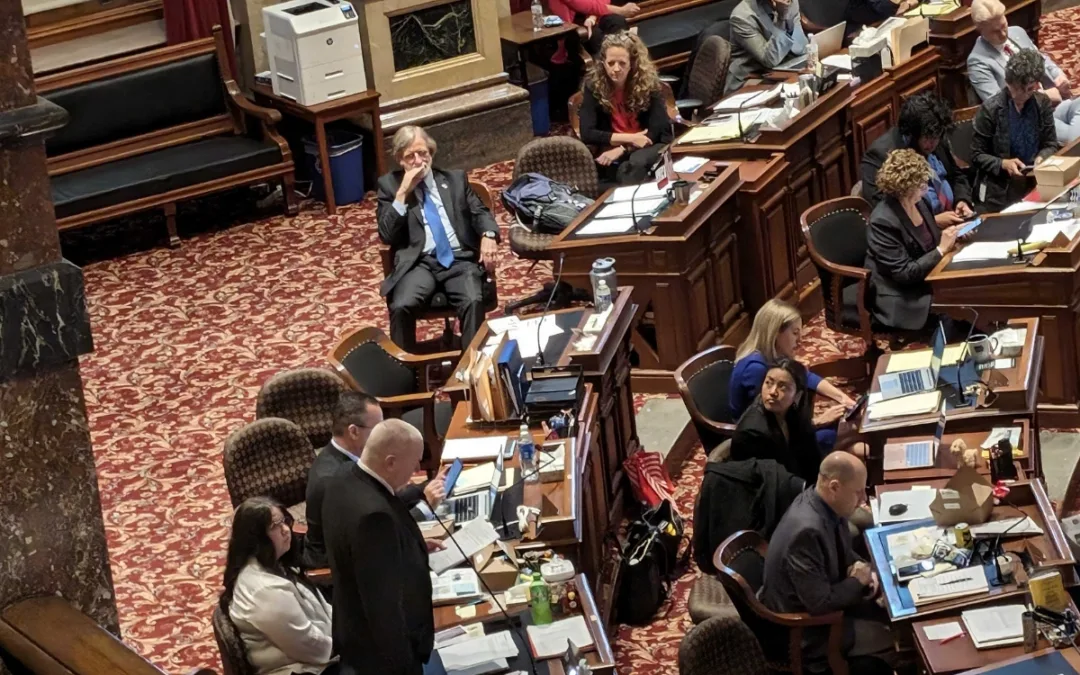
Watching eight hours of forums is a lot to process. Unless you’re going to sit down and watch all of them, like I did, it’s hard to get a feel for how the candidates truly feel about some of these issues. Even then, it can all get sort of jumbled into one big discussion.
If you’re relying on news coverage, which we recommend, that will provide adequate analysis, but it can still fall short of providing the full picture of the candidates’ character. Throughout the week, there was a handful of moments where this shined through.
So, while these are long quotes (candidates are long-winded folks), here are five moments from the forums that drew big applause and seemed to make a genuine connection with those in attendance.
Governor Steve Bullock – Bill and Rosy
Bullock was asked about reverse mortgages hurting seniors who have no other choice, trying to balance their budgets for their golden years: One of the reasons seniors seek out reverse mortgages is that they can’t afford their long-term care. How does your plan deal with the cost of long-term care?
“We hear about these big abstract policy stuff. I kind of view it through, we’ll call it Bill and Rosy,” Bullock said. “Bill and Rosy were my grandparents. Bill was a tire salesman, Grandpa Bill, all his life. And, you know, he did pretty well. They retired, they did well, and they were living in the Smoky Mountains, Franklin, North Carolina. Rosy got dementia. Bill had never done the books and he was the most trusting guy in the world. There I was in Montana having to try to get a power of attorney because Bill was giving away his money to darn near everyone, and he wasn’t giving it away. He was getting scammed out of it.”
“So, I had to take control of Grandpa Bill’s checkbook,” Bullock explained. “Talk about taking away dignity, and then we got to the point, because Grandma Rosy was in a long-term care facility where, between what he lost by the scammers and what that was paying, they spent their whole life working so damn hard and things got more and more difficult. And where it ended up, though, is Bill had to say, ‘alright, now I have to exhaust all my money,’ because that’s the only way he would live in as he got older is, Medicaid would pay for Bill’s long-term care at the end of that. And we’re paying a hundred and fifty-four billion dollars a year through Medicaid for long-term care.”
“It doesn’t make sense when we know that two thirds of the folks over the age of 65 are going to need that long-term care. So, we could add a supplemental program to Medicare, maybe thirty-five, forty dollars a month, and that would be like an insurance along the way for those that wanted to pay into it, and that would cover long-term care.”
[inline-ad id=”0″]
Senator Bernie Sanders – Health Care Deniers
Sanders was asked about the people in the health care industry whose job it is to process payments – what happens to them with Medicare for All?
“Hopefully, over a period of time, they will be transitioned into the healthcare system,” Sanders said. “The reason we pay so much more than any other country for health care is we have an incredible bureaucracy and we spend hundreds of billions of dollars a year on billing. So, to be honest with you, if someone is sitting there in an office telling you that sorry, you are not going to get covered for what you thought you were going to get covered for. Or a doctor telling you, you can’t do this therapy or that therapy, that is not health care. That is denying health care. That is bureaucracy. That is a waste. So, I want as many of those people as possible to get trained to provide health care to other people, not just sit around billing people.”
As a follow-up: Some of your competitors have said if the party embraces Medicare for All, it will be a loser for the entire party for 2020?
“Really? That’s not the polling that I’ve seen,” Sanders said. “You know, I know I am told everybody loves private health insurance industry. Oh, they are just so fond of Aetna and all these other major corporations. I don’t believe that. I think people love their doctors. People love their nurses. People often have very good and positive experiences in hospitals when they have to go there. To be honest with you, I have not talked to anybody who loves their insurance company because they understand. What is the function of a health insurance company? To make money! It’s not to provide quality care to you, and if they could deny you the benefit you paid for, they make more money.”
Marianne Williamson – Sickness Care vs Health Care
Williamson was asked: Americans are spending a lot of energy talking about how to care for sick people, but not as much about keeping people well. How far does your plan go to have health plans cover physical fitness? Wellness plans like yoga and meditation and homeopathic treatment?
“I’ve made it very clear that most of what we have in America is a sickness care system rather than a health care system,” Williamson said. “You can’t just take medicine, you have to cultivate health. And as we get older, this is even more true. When I was younger, I did yoga to look good. I do it now to stay alive and stay healthy. So, even more attention needs to be given in terms of our bones, osteoporosis or heart disease, diet, all of these things.”
“We have a much higher level of chronic illness in our country compared to other countries, and this only increases as we get older,” she added. “So, absolutely, for all age groups, our health care system should have much more to do with preventative care; to exercise, to diet, etc. But we also need to deal with how much toxins, how much carcinogens, how many horrifying elements are allowed in our food because of chemical policies, because of food policies, because of agricultural policies, because of environmental policies.”
Andrew Yang – “I have no interest in living in a country where we can’t retire; where being old and poor will be the new norm”
Andrew Yang’s first question came from an audience member, past retirement age, who became insulin-dependent ten years ago after a kidney transplant. Prior, he had never taken prescription drugs, but now requires seven shots per day and is on 32 pills. Prices have steadily risen over the last five years and, very recently, he saw $500 increase in his monthly costs, which has led him to again seek employment to cover the costs. He asked what Yang would do as president to lower the costs of life-saving prescriptions.
“Your situation is not yours, and by that what I mean is there are so many other Americans in the same boat, that are being gouged,” Yang replied. “Notice drug prices never seem to go down, they only seem to go up. They only seem to have one direction. And this is a uniquely American problem, unfortunately, because our society has been overrun by corporate special interests, including the drug companies, and makes it so that Medicare can’t even negotiate drug prices on behalf of the American people. The drug lobby managed to push that to the side.”
“But then, bigger picture, we have to make it so that when you need the money to survive, that you’re not heading back to the workforce trying to find a job in a workforce that might not welcome you or have a path forward,” Yang said. “We need to rewrite the rules of the economy so it actually works for us, the citizens and owners of this country. It doesn’t feel like we’re the owners anymore, it feels like we’re passengers on a ship that we have less control over. But, we’re still the owners of this democracy…does it make any sense to you all that drug companies can charge Americans two, three, four times what they charge people in other markets?”
“It’s because people in other parts of the world have governments that are saying there is no way you’re going to charge that for this drug,” he continued. “America doesn’t do it. Here, drug prices get set by the company and we’re all just stuck with it. These companies only know one language, dollars and cents, and we’ve got to hit them where it hurts. They’ve long ago lost their sense of public interest, public good, public health, no. We have a system now where it just rewards the bottom line. I have no interest in living in a country where I go into a convenience store or a grocery store and there is an elderly American working, just to survive, instead of a teenager who used to do that job just for beer money.”
Senator Elizabeth Warren – The Courage to Take on Drug Companies
A popular topic for her, Warren discussed drug companies “finagling around” in the generics markets to tamp down competition. Warren’s response to this problem is to sign government contracts with manufacturers to release generic drugs into the market, priced at “cost plus,” which would be a negotiated profit-margin set ahead of time.
After concluding this explanation, the moderators asked why she thinks that is a better move than Biden’s plan to strip companies of their Medicare and Medicaid opportunities if their raised their prices above and beyond inflation rates.
“If you’re asking the question should we negotiate with drug companies, I’m all in on that. Of course, we should negotiate prescription drug prices with drug companies,” Warren responded. “I’m just trying to add a little more muscle behind that negotiation. I’m for it. Should we be able to import drugs from foreign countries, so long as they meet the safety standards here in United States? You bet we should be able to import those drugs!”
“There are a lot of ways we can go at this,” she continued. “And for companies, the 10% that are still in the period of complete patent protection on their drugs, if somebody is charging a price right through the roof, we have the capacity, as the federal government, to say no. But this was the point I was starting with; the reason we have a problem with drug prices in America is not because of science. It’s not because we don’t understand it. It’s because the drug companies are paying the pipers in Washington, and they call all the tunes.”
“We have a Washington, right now, that works great for drug companies, and they are spending big money on campaign contributions, on lobbyists, on bought-and-paid-for experts, on think tanks, on advertising, to keep things just as they are. What we need most in this country is some courage to take on the giant drug companies and say ‘no more of this,” Warren concluded.
by Josh Cook
Image from AARP live feed
Posted 7/23/19
Politics

AEAs cutting workers in wake of Republican legislation
Iowa legislators said a new bill cutting money for agencies that help students with disabilities wouldn't affect services. But area education...

He said what? 10 things to know about RFK Jr.
The Kennedy family has long been considered “Democratic royalty.” But Robert F. Kennedy, Jr.—son of Robert F. Kennedy, who was assassinated while...
Local News

No more Kum & Go? New owner Maverik of Utah retiring famous brand
Will Kum & Go have come and gone by next year? One new report claims that's the plan by the store's new owners. The Iowa-based convenience store...

Here’s a recap of the biggest headlines Iowa celebs made In 2023
For these famous Iowans, 2023 was a year of controversy, career highlights, and full-circle moments. Here’s how 2023 went for the following Iowans:...




